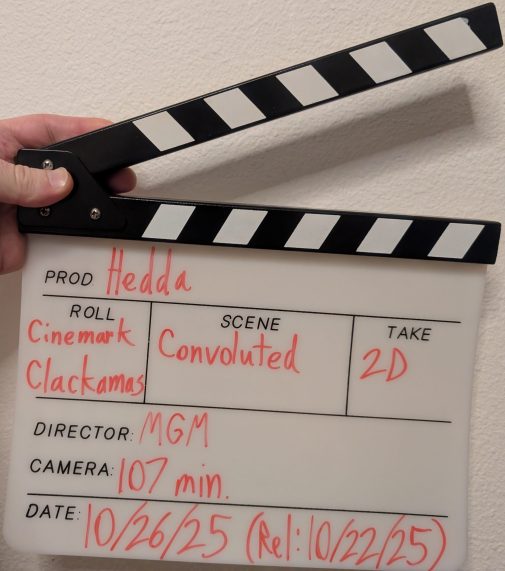Nia DaCosta is writing/directing/producing, with Tessa Thompson starring/producing. That’s all the poster told me, and that’s all I needed to hear.
Hedda is a loose adaptation of the play by Henrik Ibsen, one of those all-time classics that was poorly reviewed in its day. However, as a producer/director/playwright, I must say that I haven’t heard much talk about this play from my admirable friends and colleagues in the local theatre community. And looking over the synopsis in Wikipedia, I can take a few guesses as to why this script hasn’t aged particularly well.
So let’s see what happens when DaCosta gets through with it.
The film unfolds over the course of a long, expensive, and increasingly ugly wedding reception for Hedda Gabler (Thompson), who recently married George Tesman (Tom Bateman). It’s perhaps worth mentioning that Hedda is still primarily known as the bastard daughter of a late respected general, while her new husband is an academic milquetoast. As a direct result, pretty much all of the characters — including Hedda herself — still refer to her by her maiden name. During her wedding reception. Yeah, George doesn’t like that.
Speaking of which, George is in the running for a professorship, and the competition is exceptionally fierce. His primary competition is Eileen Lovborg (Nina Hoss), a specialist in analyzing various depictions of sex through the ages. Not only is Eileen far more accomplished — and hiring an open lesbian would make the university look good for diversity’s sake — but Eileen’s got a secret weapon: A manuscript for an upcoming heavily-anticipated sequel in which Eileen speculates on the future of sex by analyzing various trends and historical data points.
I hasten to point out that Eileen wrote the manuscript in collaboration with Thea Clifton (Imogen Poots), and the two are lovers on the side. Also, both of them have long and sordid personal histories with Hedda. It’s all very messy and complicated.
Then there’s the matter of Judge Brack (Nicholas Pinnock), who also has a long and sordid personal history with Hedda. This history is further complicated by the tiny little detail that Hedda and George are only being kept afloat by a personal loan from Brack. That’s a whole ‘nother kind of messy and complicated.
Anyway, George is out of his depth. He’s on the verge of bankruptcy, and he’s losing a potential job to an open lesbian. Not only that, but he married a woman who needs more than he can finanically, emotionally, or sexually provide. The poor guy desperately needs the professorship not only for his own professional and financial sake, but also for the sake of his fragile male ego.
Right there at the center of this political web is Hedda herself. Who does she want, and what does she want for them? What does she want for herself? What is she willing or able to do to get what she wants? The answers to all of these questions are hazy, and finding out is a long, slow burn.
Shortly and simply put, Hedda is a sociopath. She’s an agent of chaos, a master of manipulation and deceit. I need hardly add that because she knows all the central players so intimately, she’s uniquely capable of seducing them and puppeteering them toward a particular end. As to what that end is, and how or whether it’ll come back to bite her, finding that out is half the fun.
To be entirely honest, this is a difficult movie to judge. It’s a brisk 100-minute movie loaded with so many political/sexual relationships, sufficiently keeping track of them all would take about two or three viewings and a flowchart. Hell, the film is honestly kind of overstuffed — they got Kathryn freaking Hunter in there to play the head waiter, and she barely does anything! But I did eventually get up to speed, and that conveniently happened right when Hedda’s various machinations kicked into gear. And man oh man, when Hedda starts causing trouble, the trouble keeps coming faster than even she can keep up with.
Moreover, DaCosta knew exactly what she was doing when she cast this picture with regards to race and sexual identity. Precisely because Hedda is a black woman (the bastard, likely biracial daughter of a general, no less), she’s ideally placed to provide commentary on the white patriarchy. That’s doubly true of Eileen and Thea, both of whom are here positioned as lesbian women fighting twice as hard to get half as much. These are women who have literally less than nothing without their academic accomplishments and the credit thereof.
And George is the mediocre white man who can’t scrape together a solvent career in an industry shaped of, by, and for other mediocre white men. What does that say about him, do you wonder?
To be certain, Hedda is a superbly crafted film. The casting is rock-solid, the visuals are gorgeous, and the jazzy expressionist score from Hildur Guonadottir does a lot to help clarify Hedda’s mental/emotional state. The unfortunate drawback is that this is also a highly complicated film, with a lot of characters, relationships, stated agendas, and secret agendas to keep track of. And that’s all before we even get started on the thoughtful and nuanced feminist statements.
This is definitely a film for the arthouse audience. Anyone coming into this had better be ready to pay close attention and keep their brains turned firmly on throughout the full runtime. Even then, I’d recommend waiting for home video, the better to pause, rewind, read the closed captioning, or whatever else is necessary.
This is definitely a film worth watching, but your mileage may vary as to whether it’s worth the effort.
